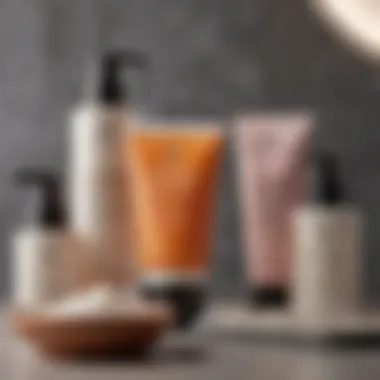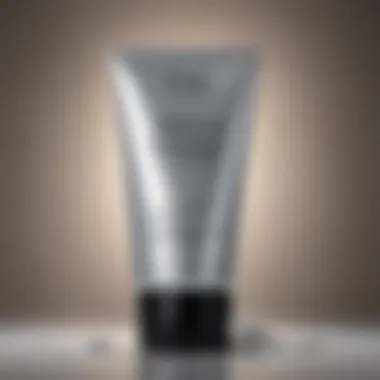Top Exfoliating Face Washes for Mature Skin Care


Intro
As skin matures, it undergoes a myriad of changes that can impact its texture and appearance. These changes often lead to dullness, uneven tone, and enlarged pores. Therefore, choosing the right exfoliating face wash becomes crucial in a skincare routine. Exfoliation plays a key role in revealing fresh, new skin underneath and enhancing the effectiveness of other treatments.
Exfoliating face washes for mature skin are specially formulated to address the unique challenges aged skin faces. With ingredients that promote gentle yet effective exfoliation, these products can help to improve skin texture, fade dark spots, and encourage a youthful glow.
In this guide, we will delve into the essential factors to consider when selecting an exfoliating face wash for mature skin. Doing so empowers readers to make knowledgeable choices that align with their specific skincare goals. We will also examine effective ingredients that are particularly beneficial for aged skin, alongside a curated selection of top products available in the market.
Understanding your skin's specific needs allows for a tailored approach to skincare, fostering both health and beauty.
Understanding Mature Skin
Understanding mature skin is essential for developing an effective skincare routine. As skin ages, it undergoes various changes that impact its texture, elasticity, and overall appearance. In this article, we will explore the defining characteristics of mature skin and the potential concerns that may arise with age. This knowledge can help in choosing the right exfoliating face washes to maintain healthy skin.
Characteristics of Mature Skin
Mature skin typically shows signs of aging, including increased dryness, loss of firmness, and fine lines and wrinkles. The skin may also appear duller due to a decrease in cell turnover. Key characteristics include:
- Thinner epidermis: With age, the outer layer of skin, called the epidermis, becomes thinner, which may lead to changes in texture and a more fragile surface.
- Reduced collagen production: Collagen is essential for skin elasticity. As one ages, the production of collagen decreases, leading to sagging skin and deeper wrinkles.
- Decreased oil production: The sebaceous glands produce less oil, resulting in drier skin. This dryness can contribute to the appearance of fine lines.
With a solid grasp of these characteristics, tailored skincare solutions can be implemented to address individual needs effectively.
Common Skin Concerns
Mature skin is prone to a variety of concerns that can impact confidence and quality of life. Common issues include:
- Wrinkles and fine lines: The loss of collagen and moisture often results in visible signs of aging.
- Uneven skin tone: Age spots and pigmentation changes can appear, affecting the complexion.
- Dullness: Reduced cell turnover may lead to a lackluster appearance, making the skin look tired and less vibrant.
- Sensitivity: Aging skin is often more sensitive, making it reactive to products or environmental changes.
Overall, understanding these common concerns is crucial. It allows for better product selection, especially exfoliating face washes that address these issues specifically.
The Role of Exfoliation
Exfoliation is a vital aspect of any skincare regimen, especially for mature skin. As skin ages, its natural exfoliation process slows down. Accumulated dead skin cells can lead to a dull appearance and enhanced visibility of fine lines and wrinkles. Thus, understanding the role of exfoliation is not just beneficial; it is essential for maintaining the skin’s vigor and youthful glow. By regularly incorporating exfoliation, mature skin can regain its luminosity and softness.
Benefits of Exfoliating
Exfoliating face washes present numerous advantages:
- Improved Skin Texture: Regular exfoliation smooths the surface of the skin. This makes makeup application easier, allowing products to glide on effortlessly.
- Enhanced Product Absorption: When dead skin cells are removed, the skin can more readily absorb serums, moisturizers, and other active treatments. This increases the overall effectiveness of skincare products.
- Diminished Appearance of Pores: Exfoliation can help clear impurities that accumulate in pores, which in turn may minimize their appearance.
- Even Skin Tone: With consistent use, exfoliating can help reduce hyperpigmentation and unveil a more uniform complexion.
- Stimulation of Collagen Production: Some exfoliation methods promote increased collagen production in the skin, which is crucial for maintaining firmness and elasticity.
"Regular exfoliation is not just about removing layers; it promotes a thriving environment for skin health."
Types of Exfoliation
Understanding types of exfoliation is crucial when selecting the right product for mature skin. There are two main categories:
- Chemical Exfoliation: This involves the use of acids or enzymes to dissolve dead skin cells. Chemical exfoliants often provide deeper penetration, which can be especially beneficial for aging skin. Common types include:
- Physical Exfoliation: This method uses granular substances or tools to manually buff away dead skin cells. While effective, physical exfoliants must be used with caution on mature skin to prevent irritation. Common examples are scrubs containing beads or natural materials.
- AHAs (Alpha Hydroxy Acids): Derived from fruits, they are effective for superficial exfoliation.
- BHAs (Beta Hydroxy Acids): These are oil-soluble and can penetrate deeper into the pores, making them ideal for those with oily or acne-prone skin.
- Enzymes: Natural enzymes derived from fruits, such as papaya or pineapple, offer a gentle approach to exfoliation and are beneficial for sensitive skin types.
Why Mature Skin Needs Special Care
Mature skin has unique characteristics and needs that differ from younger skin. The aging process contributes to a reduction in natural oils and a decrease in skin cell turnover. This results in a more fragile and thin skin barrier. Considerations include:
- Fragility: Mature skin is often thinner and more susceptible to irritation. Thus, gentle exfoliation choices are paramount.
- Hydration Needs: As skin ages, it requires more moisture. Exfoliating products should not strip the skin of its essential oils.
- Sensitivity: Many individuals experience heightened sensitivity as they get older. Therefore, selecting non-irritating, calming ingredients can help minimize adverse reactions.
Key Ingredients in Exfoliating Face Wash
Choosing the right exfoliating face wash for mature skin requires an understanding of the key ingredients. These ingredients not only enhance the cleansing process but also provide additional benefits that support skin health. To select an effective product, it's crucial to recognize how these elements work and what specific advantages they offer.
Chemical Exfoliants
Chemical exfoliants break down dead skin cells through various acids and enzymes. They are gentler than physical scrubs and are often better suited for mature skin, which may be more sensitive.
AHAs
Alpha Hydroxy Acids (AHAs) are water-soluble and derived from fruits. They effectively slough off dead skin cells and promote cell turnover, making them a popular choice for mature skin. One of their key characteristics is their ability to improve skin texture and tone. AHAs, such as glycolic acid, penetrate the skin's surface to enhance hydration and elasticity.


The unique feature of AHAs is their role in stimulating collagen production, which is essential for maintaining youthful skin. While beneficial, users should approach AHAs cautiously, as they can sometimes cause irritation, especially if used in high concentrations or with sensitive skin types.
BHAs
Beta Hydroxy Acids (BHAs), primarily salicylic acid, are oil-soluble. This allows them to penetrate deeply into the pores, making them effective for those with oily or acne-prone skin. For mature skin, BHAs help in exfoliating the surface while also addressing clogged pores.
The key characteristic of BHAs is their anti-inflammatory properties, which can reduce redness and swelling. They are known to help improve skin clarity and texture without stripping essential moisture. However, like AHAs, BHAs should be used in moderation to prevent over-exfoliation and possible irritation.
Enzymes
Enzymes are another type of chemical exfoliant that works gently to dissolve dead skin cells. Common sources include papaya and pineapple. Unlike AHAs and BHAs, enzymes produce a milder effect, which makes them suitable for delicate skin types often found in mature individuals.
Their main advantage is their ability to exfoliate without harsh scrubbing. Enzymes are beneficial in maintaining moisture levels while promoting a refreshed complexion. Some may find these ingredients less effective for deep exfoliation, but they are excellent for regular use.
Physical Exfoliants
Physical exfoliants use granules or particles to manually scrub away dead skin. They are suitable for a quick exfoliation but require careful selection for mature skin types to prevent microtears.
Beads
Beads are common in many scrubs. They come in various materials, including synthetic and natural options. Their key characteristic is their ability to provide immediate exfoliation through physical abrasion. While beads can give instant results, they can also be too harsh on mature skin, leading to irritation and damage.
A particular concern is the environmental impact of plastic beads, leading many brands to shift towards biodegradable materials.
Scrubs
Scrubs incorporate a combination of beads or granules with a cream or gel base. They aim to remove dead skin through friction. While they can be beneficial for quick results, users must choose gentler formulations suitable for sensitive skin to avoid over-exfoliation.
The downside is that some scrubs can lead to irritation if used too frequently or contain harsh ingredients.
Frictions
Frictions refer to products that offer a combination of both chemical and physical exfoliation. They often provide a lighter texture and are particularly effective in stimulating circulation while cleansing the skin. The advantage of frictions is their dual action, enabling effective exfoliation without being overly abrasive.
However, individuals should be cautious and observe how their skin reacts, as they might not always yield the desired results without irritating the skin.
Choosing the right exfoliating face wash for mature skin involves a balance of ingredients. Understanding each component allows individuals to make informed choices, ensuring the maintenance of healthy, youthful skin.
Considerations for Choosing Exfoliating Face Wash
Selecting the right exfoliating face wash is crucial for maintaining healthy skin, especially for mature skin types. The facial skin undergoes many changes as one ages, leading to unique difficulties. Properly considering various aspects can help optimize the results of exfoliation and avoid potential complications. There are significant elements like skin sensitivity, ingredient allergies, and pH balance to take into account when making your choice.
Skin Sensitivity
Mature skin is often more sensitive compared to younger skin. This sensitivity can stem from the natural loss of moisture and the reduction of skin's barrier function. As a result, products that are too harsh may cause irritation, redness, or discomfort.
For this reason, it is important to choose exfoliating face washes that are specifically formulated for sensitive skin. Look for products that contain mild exfoliants or are labeled as hypoallergenic. Ingredients like aloe vera or chamomile can help soothe the skin while delivering the exfoliation benefits. Moreover, patch testing new products can help ensure that they won’t cause adverse reactions.
Ingredient Allergies
Another vital factor to consider is the presence of any ingredient allergies. Many consumers have sensitivities or allergies to specific substances, which can trigger reactions ranging from mild irritation to severe dermatitis. It is essential to review the ingredient labels carefully.
Common allergens include fragrances, parabens, and certain botanical extracts. Skin care products that are fragrance-free or formulated with minimal ingredients reduce the risks associated with allergic reactions. If a past product sparked a negative response, it could be wise to avoid similar formulations in the future, prioritizing labels that provide transparency and clarity.
"The skin is the largest organ of the body, and careful management of its health can have lasting effects on overall well-being."
pH Balance
The skin naturally maintains a delicate pH balance, usually between 4.5 and 5.5. Exfoliating face washes that are too alkaline or overly acidic can disrupt this balance, leading to irritation, dryness, and premature aging. Thus, when selecting an exfoliating product, seek out items that are pH-balanced or specifically formulated for mature skin.
Ingredients like glycolic acid or lactic acid not only function as exfoliants but also help maintain this ideal pH level. A balanced product ensures that the skin retains its natural moisture while effectively removing dead skin cells.
In summary, carefully evaluating these considerations—skin sensitivity, ingredient allergies, and pH balance—will lead to better choices when selecting exfoliating face washes. As mature skin deserves special attention, prioritizing these factors can enhance the skincare routine and lead to healthier, more radiant skin.
Top Recommendations for Exfoliating Face Washes
Exfoliating face washes are critical in addressing the unique needs of mature skin. As skin ages, it becomes thinner and loses its natural glow. Products specifically formulated for this demographic not only cleanse but also remove dead skin cells, which can accumulate and cause dullness. By choosing the right exfoliating face wash, one can invigorate the skin and enhance its overall texture.


Product A
Ingredients
The formulation of Product A features glycolic acid, a well-regarded chemical exfoliant. Glycolic acid is derived from sugarcane and effectively penetrates the skin's surface. This ability makes it a popular choice among skincare enthusiasts aiming to achieve smoother skin. Moreover, its small molecular size allows for deep hydration, which can counteract dryness often found in mature skin.
Benefits
The advantages of using Product A extend beyond mere exfoliation. This product promotes cell turnover, which is crucial for maintaining a youthful appearance. Regular use not only brightens the complexion but also diminishes fine lines and wrinkles. The gentle action ensures that the skin remains intact while achieving the desired results.
Usage
For optimal benefits, it is recommended to use Product A two to three times a week. This frequency allows the skin to acclimate without overwhelming it. Users should apply it on damp skin, massaging gently before rinsing thoroughly. The ease of application and quick results make it a favored option in mature skincare routines.
Product B
Ingredients
Product B features salicylic acid as its central ingredient. Known for its ability to penetrate oily pores, salicylic acid is especially beneficial for those dealing with clogged pores and uneven textures. Though typically associated with younger skin, its benefits for mature skin are significant as well. It helps clear out impurities, making the skin feel refreshed.
Benefits
The unique feature of Product B is its oil-controlling ability without causing dryness. It balances natural oils while providing a thorough cleanse. This characteristic makes it a popular choice for those experiencing both dryness and oiliness as they age. The result is a clearer, healthier complexion that retains moisture.
Usage
For best results, apply Product B once daily. It can be used in the morning or evening, depending on personal preference. A pea-sized amount is sufficient, and it should be gently massaged into the skin before rinsing off carefully. Regular usage can lead to noticeable improvements within a few weeks.
Product
Ingredients
In its formulation, Product C combines natural enzymes such as papaya and pineapple. This unique blend provides a gentler approach to exfoliation. Enzymes work to break down dead skin cells without the abrasive action typically associated with physical exfoliants. This gentle treatment is ideal for mature skin, which can be more susceptible to irritation.
Benefits
The benefits of Product C include improved luminosity and a reduction in the appearance of age spots. The enzymatic approach to exfoliation means it can be used more frequently without the risk of over-exfoliation. Users often report a softer and more radiant complexion after consistent use, highlighting its effectiveness.
Usage
This product can be used up to three times weekly. An effective method is to apply it on dry skin, allowing it a few minutes to work before rinsing. Many users find that it complements their regular skincare routine very well.
Product
Ingredients
The blend in Product D features a mild physical exfoliant, jojoba beads. These beads offer a gentle scrubbing effect that is suitable for mature skin types. Together with aloe-vera, this product provides both exfoliation and hydration, preventing the skin from feeling too stripped after use.
Benefits
The main advantage of Product D is its dual-action formula, which cleanses while leaving the skin soft and hydrated. Users appreciate its ability to exfoliate without irritation, allowing them to maintain their skin's integrity.
Usage
This product should be used once or twice a week. When using it, a small amount should be worked into wet skin using gentle circular motions. Afterward, rinse thoroughly and follow with a moisturizer for the best effect.
Application Techniques for Optimal Results
When it comes to achieving the best results from exfoliating face washes, the way in which these products are applied plays a crucial role. Understanding the proper application techniques can enhance the effectiveness of the product, minimize potential irritation, and ensure that the skin benefits fully from the exfoliation process. This section discusses essential factors that influence the efficacy of exfoliation.
Frequency of Use
Determining the right frequency for using an exfoliating face wash is essential for mature skin. Over-exfoliating can lead to irritation, redness, and sensitivity, while under-exfoliating may not yield the desired benefits. For most mature skin types, using an exfoliating wash two to three times per week is often recommended. This frequency allows for adequate skin renewal without overwhelming the skin's barrier.
- Skin Type Considerations: It is essential to note that different skin types may necessitate different frequencies. For instance, those with sensitive skin should start with once a week to observe how their skin reacts.
- Seasonal Adjustments: Changes in the seasons can also affect how often you should exfoliate. In winter, skin may be drier, so less frequent exfoliation may be better.
Best Practices


Employing best practices in application technique can significantly enhance the outcomes of using exfoliating face washes. Here are some guidelines to follow:
- Gentle Application: Use gentle, circular motions to apply the face wash. This technique helps to effectively slough away dead skin cells without causing micro-tears in the skin.
- Avoid Sensitive Areas: Take care to avoid applying exfoliating products around sensitive areas such as the eyes and lips.
- Rinse Thoroughly: Ensure that you rinse off the product completely with lukewarm water. Residual exfoliating agents can lead to irritation if left on the skin.
- Follow with Moisturizer: After exfoliating, it is important to apply a good moisturizer. Mature skin benefits from added hydration to help maintain the skin barrier and prevent dryness.
Important Note: Always patch-test a new exfoliating face wash to prevent adverse reactions.
Potential Side Effects of Exfoliation
Exfoliation is a critical step in the skincare routine, particularly for mature skin. However, it is essential to be aware of its potential side effects, as these can significantly impact skin health. Understanding these side effects helps individuals make informed choices regarding exfoliating face washes and techniques.
Irritation and Redness
Irritation and redness are common reactions after exfoliation, especially for mature skin. The skin may become sensitive to products, and this reaction can lead to discomfort. Sensitive areas of the face, like the cheeks and forehead, are often more prone to these issues.
Factors that contribute to irritation include:
- Type of Exfoliant: Chemical exfoliants often cause more redness than physical ones, primarily when used in high concentrations.
- Frequency of Use: Overuse of exfoliating products leads to increased irritation.
- Underlying Skin Conditions: Skin conditions such as rosacea or eczema magnify sensitivity.
To mitigate irritation, it is advisable to:
- Start with a lower concentration of active ingredients.
- Conduct a patch test before full application.
- Consider using exfoliants less frequently.
Over-Exfoliation
Over-exfoliation is another significant concern. This occurs when an individual exfoliates too frequently or employs products with strong active ingredients without proper consideration. The skin can become stripped of its natural oils, leading to severe dryness, peeling, and even breakouts.
Symptoms of over-exfoliation include:
- Excessive dryness
- Persistent redness
- Increased sensitivity
- Development of fine lines due to loss of moisture
To prevent over-exfoliation, it’s crucial to follow guidelines such as:
- Limit exfoliating to two to three times per week.
- Use a gentle product suited for mature skin.
- Monitor the skin’s response and adjust routines accordingly.
Effective exfoliation should balance removing dead skin cells while preserving skin integrity.
This understanding of the side effects of exfoliation empowers individuals to cultivate a personalized skincare regimen that addresses the specific needs of mature skin while avoiding potential harms.
Complementary Skincare Practices
Complementary skincare practices play a vital role in enhancing the benefits of exfoliation. While exfoliating face washes are essential in removing dead skin cells, they work hand-in-hand with other skincare routines. Incorporating complementary practices ensures that mature skin receives the nourishment and protection it needs to maintain vitality.
A balanced skincare regimen involves several steps that contribute to overall skin health. Following exfoliation, moisturizing is crucial. It replenishes hydration and can soothe the skin, particularly after it has undergone the exfoliation process. By applying moisturizers rich in vitamins and fatty acids, mature skin can feel rejuvenated and supple.
Moreover, sun protection is a non-negotiable aspect of any skincare practice. Mature skin tends to be more susceptible to sun damage, which can lead to further aging signs such as wrinkles and sunspots. Therefore, using a broad-spectrum sunscreen daily is a significant step. Combining the benefits of exfoliation with hydration and sun protection creates a robust routine that defends against environmental aggressors.
In summary, the synergy between exfoliating face washes and complementary practices forms a comprehensive approach to skincare for mature skin. By acknowledging the importance of elements such as moisturization and sun safety, one lays the foundation for maintaining youthful, healthy skin.
Moisturizing after Exfoliation
Moisturizing after exfoliation is a fundamental step that should not be overlooked. Exfoliation, while beneficial, can sometimes leave the skin vulnerable or feeling tight. Apply a nourishing moisturizer that suits your skin type immediately after cleansing to restore moisture levels. Look for products that contain hyaluronic acid, glycerin, or ceramides, as these ingredients help to lock in hydration and form a protective barrier on the skin.
Key Benefits of Moisturizing After Exfoliation:
- Restores moisture content
- Helps soothe any post-exfoliation irritation
- Enhances skin texture and smoothness
- Protects against environmental damage
It is essential to choose a moisturizer that matches the skin's needs, especially for mature skin, which may require richer formulations.
Sun Protection
Sun protection is crucial for all skin types, and even more so for mature skin. After exfoliating, the skin can be more sensitive and reactive to UV rays. Daily application of a broad-spectrum sunscreen can help mitigate the risks associated with sun exposure, which can lead to further skin damage and aging.
Invest in a sunscreen with an SPF of at least 30 and ensure that it protects against both UVA and UVB rays. Application should occur every morning, even on cloudy days or when indoors, as UV rays can penetrate windows. Keeping the skin safe from harmful sunlight aids in maintaining a youthful appearance and preventing additional skin concerns.
Ending
Exfoliation plays a crucial role in maintaining the health of mature skin. As skin ages, it naturally becomes less efficient at shedding dead skin cells. This can lead to a dull appearance, uneven texture, and clogged pores. Hence, incorporating an exfoliating face wash specifically tailored for mature skin is essential. The right exfoliator not only removes the buildup of dead skin but also enhances the absorption of other skincare products, making them more effective.
Final Thoughts on Exfoliation for Mature Skin
To conclude, understanding how to properly exfoliate mature skin is vital for achieving a radiant and youthful complexion. The goal is to improve skin texture while minimizing irritation. Here are some key points to remember:
- Be Gentle: Mature skin often requires a gentler approach. Choose products with mild exfoliating agents.
- Frequency: It is important to not over-exfoliate. Once or twice a week is generally sufficient, depending on individual skin tolerance.
- Hydration: Always follow up with a good moisturizer, as exfoliating can leave skin feeling dryer than usual.
- Sun Protection: Exfoliation can make skin more sensitive to the sun. Daily use of sunscreen is essential to protect against sun damage.
In summary, through informed choices and consistent application, exfoliation can significantly revitalize mature skin, fostering a healthier appearance and boosting confidence.



